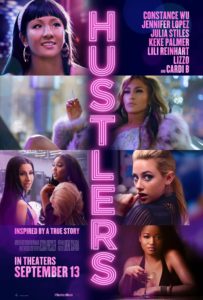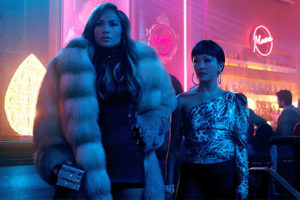Written and Directed by Lorene Scafaria | 110 min | Netflix
In the past 12 months, we’ve seen three movies that feature a group of working class, multiethnic women teaming up to do crime—Widows, The Kitchen, and now Hustlers. That marks a genre change, and I, for one, am thrilled to see it. Based on a true story of how a group of New York strippers took criminal advantage of Wall Street clients, Hustlers is remarkable for how it repurposes a Scorcese-like style and storyline with a feminine and feminist perspective.
Dorothy aka Destiny (Constance Wu) is our lead, a young woman from Queens taking care of her grandmother (Wai Ching Ho) and working at a downtown club in 2007. Time at this club is pretty good at first—the dancers are supportive of each other, for the most part, with Ramona (Jennifer Lopez) the den mother who looks out for the women. She shows Destiny a few moves, and they live well on the cash they earn from wealthy suits. Then the 2008 financial crash happens, and things go sour. A little further down the road, Destiny, Ramona, and their cadre of fellow dancers step over the line into criminal activity to take advantage of wealthy wall-streeters, with diminished concern over the wrong and right of what they’re doing.
I don’t want to say too much about what it is they do that qualifies as illegal, but by that point, the bankers and money men have been bailed out for all their irresponsibility, so there’s not a lot of sympathy for them going around. This is a movie about American wherewithal, the market forces that drive people to do things to survive and get ahead, and how one disenfranchised group feels entitled to what the other has. I was constantly reminded that there’s so little here that makes this story any different from any other tale of entrepreneurial spirit that spills into gangsterism, but that this time it’s women making the moves. This would make a dynamic double-bill with The Wolf Of Wall Street.
That’s because Scafaria has gone to the school of Scorcese, and uses many of his swooping camera tricks, lighting schemata, and music cues to sweep us from scene to scene. She’s also asking us whether we’d do what these women did if we found ourselves in their circumstances, just as Scorcese frequently humanizes men making decisions that hurt or kill people in order to realize the American dream—at what cost power, money, independence, and success. If there’s something in the comparison that works against Hustlers it’s that the stakes here are never life and death, an absent edge that keeps the drama at a personal rather than universal level.
It helps that Scafaria casts well: small roles are filled by a few faces familiar from the pop charts—Lizzo and Cardi B—as well as stand-outs Julia Styles, as the journalist who Destiny tells her story to, Keke Palmer, and Lili Reinhart.
But this is Jennifer Lopez’s movie, which she heists out from underneath Wu’s character in every scene they share. And that’s not to suggest Wu isn’t good—her Destiny one part naive, one part dense, unable to see what’s obvious to anyone watching: this won’t end well. But she’s not the most sympathetic protagonist, allowing Lopez’s blinding charisma and relentless strut to dominate. This while Ramona remains something of a mystery—she doesn’t get much of a backstory.
That doesn’t matter: The sight of Lopez grooving to Janet Jackson’s “Miss You Much” delivers a potent reel and real-life convergence, which can be a narrative accident—Lopez got her start as a Jackson backing dancer. This movie is a machine constructed to remind us of Lopez’s power at age 50 following years of so-so roles. It’s the best she’s been since Out Of Sight, and you can bet Oscar will notice.











